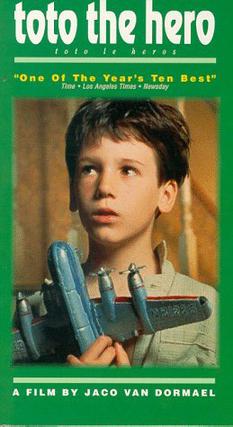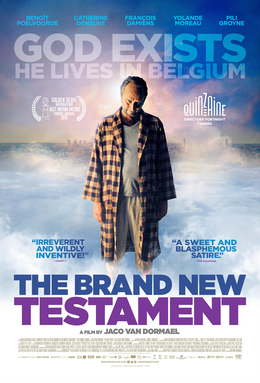
Belgian culture involves both the aspects shared by all Belgians regardless of the language they speak and the differences between the main cultural communities: the Dutch-speaking Belgians (Flemish) and the French-speaking Belgians. Most Belgians view their culture as an integral part of European culture.

Pascal Duquenne is a Belgian actor. He shared the Best Actor Award in the 1996 Cannes Film Festival for his performance as Georges in the movie The Eighth Day, with Daniel Auteuil, who played Harry. He lives in Brussels. He has Down syndrome. In 2004, he received the very high civil distinction of Commander in the Order of the Crown (Belgium).

Jaco Van Dormael is a Belgian film director, screenwriter and playwright. His films especially focus on a respectful and sympathetic portrayal of people with mental and physical disabilities.

Toto the Hero is a 1991 Belgian film by Belgian film director and screenwriter Jaco Van Dormael. It won the Caméra d'Or award at the Cannes Film Festival in 1991, and the César Award for Best Foreign Film in 1992. The film was selected as the Belgian entry for the Best Foreign Language Film at the 64th Academy Awards, but was not accepted as a nominee.

The Eighth Day is a 1996 Franco-Belgian comedy-drama film that tells the story of the friendship that develops between two men who meet by chance. Harry, a divorced businessman who feels alienated from his children, meets Georges, an institutionalised man with Down syndrome, after Georges has escaped from his mental institution and is nearly run over by Harry. The film was selected as the Belgian entry for the Best Foreign Language Film at the 69th Academy Awards, but was not accepted as a nominee.
The David di Donatello for Best European Film is a category in the David di Donatello Awards, described as "Italy’s answer to the Oscars". It was awarded by the Accademia del Cinema Italiano to recognize the most outstanding non-Italian film released in Europe during the year preceding the ceremony. The award was launched at the 2004 ceremony and cancelled after the 2018 event, following which it was incorporated into the Best Foreign Film award.

The 44th Cannes Film Festival was held from 9 to 20 May 1991. The Palme d'Or went to Barton Fink by Joel Coen and Ethan Coen.
A Magritte Award is an accolade presented by the Académie André Delvaux of Belgium to recognize cinematic achievement in the film industry. Modelled after the French César Award, the formal ceremony at which the awards are presented is one of the most prominent award ceremonies in Belgium. The various category winners are awarded a copy of a statuette. The awards, first presented in 2011, are considered the Belgian equivalent of the Academy Awards in the United States.
Maedeli la brèche is a 1980 Belgian short film written and directed by Jaco Van Dormael. The short film was shot in 1980 in Belgium with a Super 35 camera. The film starred Nico d'Oreye, Julie Dubart, Colette Forton, Marie-José Mgank and Jean-François Dufranne. The original music score was written by Pierre Van Dormael, Jaco's brother. Van Dormael wrote the film while he was a student at the INSAS in Brussels.
È pericoloso sporgersi is a 1984 Belgian short film written and directed by Jaco Van Dormael. The short film was shot in 1984 in Belgium. The film starred Mathieu Chemin, Joëlle Waterkeyn and Dirk Pauwels. It was produced by Iblis Films (Brussels). È pericoloso sporgersi tells the story of a child who has been thrust into a position where he must make an impossible decision.
L'imitateur is a 1982 Belgian documentary short film written and directed by Jaco Van Dormael. The short film was shot in 1982 in Belgium. L'imitateur tells the story of two mentally disabled which do a brief intrusion into the world of "normal people". The film was awarded the Best Documentary and Best Short Film at the 1983 Brussels Film Festival. In 2011, it appeared at the Sottodiciotto Filmfestival held in Turin in the retrospective dedicated to Van Dormael.
The André Cavens Award is an accolade presented annually by the Belgian Film Critics Association (UCC), an organization of film critics from publications based in Brussels. The André Cavens Award was introduced in 1976 by the organizing committee to honor cinematic achievement in Belgium. The name of the award comes from film director André Cavens.

The 1st Magritte Awards ceremony, presented by the Académie André Delvaux, honored the best films of 2010 in Belgium and took place on 5 February 2011 at the Square in the historic site of Mont des Arts, Brussels, beginning at 7:30 p.m. CET. During the ceremony, the Académie André Delvaux presented Magritte Awards in twenty categories. The ceremony, televised in Belgium by BeTV, was produced by José Bouquiaux and directed by Vincent J. Gustin. Film director Jaco Van Dormael presided the ceremony, while actress Helena Noguerra hosted the evening. The pre-show ceremony was hosted by film director Fabrice Du Welz.

Two Days, One Night is a 2014 drama film written and directed by the Dardenne brothers, starring Marion Cotillard and Fabrizio Rongione. It is an international co-production between Belgium, France and Italy. The film had its world premiere at the 2014 Cannes Film Festival where it competed for the Palme d'Or.
Bénédicte Liénard is a Belgian filmmaker.
Anne Lévy-Morelle is a Belgian film director and writer. After graduating from the Université libre de Bruxelles, she attended the INSAS in Brussels and began directing short films and collaborating with numerous Belgian directors.

The Brand New Testament is a 2015 fantasy dark comedy film written, produced, and directed by Jaco Van Dormael. It is a co-production among Belgium, France, and Luxembourg. The film was screened at the Directors' Fortnight section at the 2015 Cannes Film Festival. It was selected as the Belgian entry for the Best Foreign Language Film at the 88th Academy Awards, making the December shortlist of nine films, but was not nominated. The Brand New Testament received ten nominations at the 6th Magritte Awards, winning four awards, including Best Film and Best Director for Van Dormael. The film has become a cult film.

The 6th Magritte Awards ceremony, presented by the Académie André Delvaux, honored the best films of 2015 in Belgium and took place on February 6, 2016, at the Square in the historic site of Mont des Arts, Brussels beginning at 8:00 p.m. CET. During the ceremony, the Académie André Delvaux presented Magritte Awards in 22 categories. The ceremony was televised in Belgium by BeTV. Actress Marie Gillain presided the ceremony, while Charlie Dupont hosted the show for the second time.











